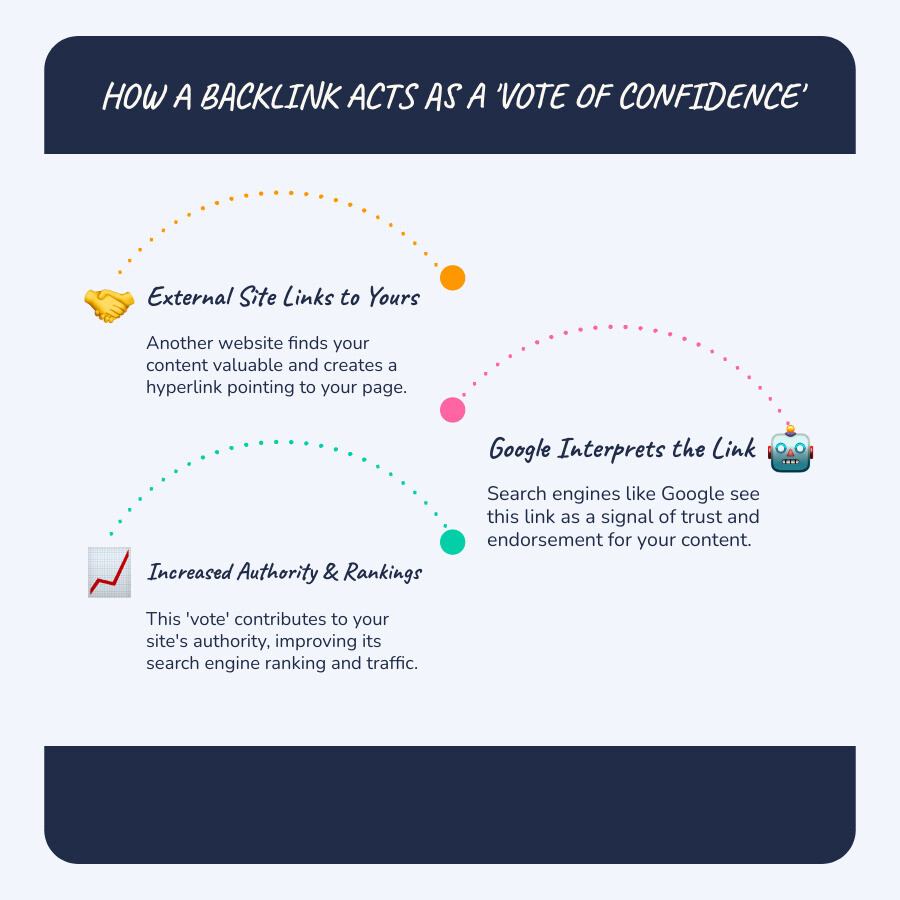Buy Backlinks Online 2025: Smart & Safe
Introduction: Your Guide to the World of Paid Links
If you aim to buy backlinks online, you’ll find them available through:
- Specialized Link Building Platforms: Marketplaces connecting you with website owners.
- SEO Agencies: Firms offering link building as part of their SEO services.
- Freelance Marketplaces: Sites where individuals sell various SEO services.
In search engine optimization (SEO), backlinks act as votes of confidence. When another site links to yours, it signals to search engines like Google that your content is valuable. This trust, or “authority,” is crucial for ranking higher in search results, which leads to more organic traffic and potential customers.
Building links naturally is time-consuming and difficult. This is why many businesses consider an alternative: buying backlinks.
This guide will walk you through the process of buying backlinks, exploring what it means, where to find them, and how to do it smartly to boost your SEO without penalties.

The Great Debate: Should You Buy Backlinks?
Should you buy backlinks online? It’s a contentious topic in the SEO world. Google’s official stance is a clear “no,” yet it remains a common industry practice. Let’s explore both sides.
Google’s official guidelines on link schemes prohibit buying or selling links that pass ranking power. The goal is to maintain fair and relevant search results. However, the reality of SEO is often different. Many professionals know backlinks are vital for ranking. Some believe Google’s approach has shifted from penalizing sites to simply devaluing or ignoring suspicious paid links. This means a poor investment might not help, but it also might not incur a direct penalty.
It’s a balancing act of risks versus rewards. The potential for faster ranking and increased traffic is tempting, especially in competitive niches. But a manual action from Google could erase your progress.
This leads to the white-hat vs. black-hat SEO discussion:
- White-hat SEO: Follows Google’s rules, earning links through high-quality content and outreach. It’s the slow, safe path.
- Black-hat SEO: Uses deceptive tactics to trick search engines, often leading to severe penalties.
Buying backlinks can fall into a “grey-hat” area. The risk depends on link quality and acquisition method. For example, sponsored content is generally acceptable if the link uses a rel="sponsored" or rel="nofollow" tag. These tags inform Google the link is paid and shouldn’t pass ranking value. Trying to make a paid link look natural without these tags is a high-risk, black-hat tactic.

Understanding the Risks
While a quick SEO boost is appealing, a wrong move when you buy backlinks online can harm your website. You might waste money on cheap, low-quality links from irrelevant sites or link farms, which Google easily spots and ignores. These links won’t help you rank and could even be detrimental.
Private Blog Networks (PBNs) are groups of websites created solely to sell links. While they may look legitimate, Google actively penalizes them. A link from a PBN can lead to a manual action, causing your rankings to plummet or your site to be de-indexed.
The most significant risk is a Google penalty, which can be:
- Manual actions: A human reviewer at Google penalizes your site.
- Algorithmic penalties: Google’s automated systems flag your site.
Both can devastate your rankings. Google looks for an unnatural link profile, characterized by a sudden influx of low-quality or clearly paid links. Recovering from a penalty is a long and costly process.
Why It’s Still a Common Practice
With such risks, why do businesses still buy backlinks online? The primary reason is to accelerate SEO growth, as earning links naturally can be extremely slow, especially in competitive markets.
Many website owners now charge “editorial” or “publishing” fees for placements that were once free. If you don’t pay, you miss out on valuable links from relevant sites.
In competitive niches, rivals are likely buying links to gain an edge. This can create pressure to do the same to keep pace. For new websites, buying links can be a shortcut to establishing initial authority and visibility, helping to attract more organic links and traffic over time.
Finally, link-building platforms can save significant time and effort compared to manual outreach. They connect you with numerous websites, making it a tempting option for those with limited resources who want to bypass the slow outreach process.
Navigating the Marketplace: Types of Backlinks for Sale
When you’re ready to buy backlinks online, you’ll find several options, each with different benefits and risks. Understanding these is key to building a healthy link profile.
Here’s a quick look at some common types:
| Type | Cost (General) | Control (Content/Placement) | SEO Impact (Potential) |
|---|---|---|---|
| Guest Posts | Medium to High | High | High |
| Niche Edits | Medium to High | Medium | High |
| Directory Submissions | Low | Low | Low to Medium |
Guest Posts
Guest posts are a highly regarded link-building method. The process involves creating an article that gets published on another website in your industry. Within the content or an author bio, a link points back to your site.
The value of guest posts lies in their natural appearance. Contextual links within an article are favored by search engines. This method also allows you to showcase your expertise and build brand authority with a new audience. For maximum impact, both the content and the publishing website must be high-quality and relevant to your niche. You also typically have control over the anchor text, which is a major SEO advantage.
Niche Edits & Link Insertions
Niche edits, or link insertions, involve adding your link to existing, high-performing content on another website. Instead of creating a new article, you leverage the authority of an already-published page.
The primary benefit is tapping into an established page’s power. Since the content is already indexed, link placement is often faster than with a guest post. These contextual links are very effective. While you have less control over the surrounding content, ensuring your link fits naturally is crucial. A quality niche edit from an authoritative, relevant page is a powerful way to buy backlinks online.
Other Link Types to Be Aware Of
Beyond guest posts and niche edits, other link types exist. Some are useful in specific contexts, while others are risky.
- Directory Submissions: Listing your site in online directories. While high-quality, niche-specific directories can offer minor value, most are low-quality and can be detrimental to your SEO.
- Forum & Comment Links: These links, found in forum posts or blog comments, typically have a “nofollow” tag and offer little to no SEO value. Overuse can make your site appear spammy.
- Social Bookmarks: Submitting your site to bookmarking platforms like Mix offers minimal direct SEO benefit today.
- .EDU & .GOV Links: Links from educational and government sites are highly valuable due to their inherent trust. However, legitimate acquisition is difficult. Be cautious of services offering them easily, as they may use risky tactics.
- Tiered Link Building: A high-risk, black-hat strategy that involves building links to your links (e.g., Tier 2 links pointing to Tier 1). Google actively penalizes this practice.
When you buy backlinks online, always prioritize quality and relevance over quantity or cost. A few excellent links are far more valuable than hundreds of poor ones.
How to Buy Backlinks Online Safely and Effectively
Successfully buying backlinks requires a smart, strategic approach. It’s about investing in links that genuinely boost your SEO, not falling into traps that could harm your site.
First, vetting sellers and platforms is crucial. Look for providers with a solid reputation, transparent processes, and positive reviews. Be wary of guarantees of #1 rankings or extremely low prices. High-quality links require effort and are valued accordingly. We at MDM Marketing, for example, focus on data-driven, ethical SEO solutions.
Remember the golden rule: quality over quantity. Google’s algorithms value a few powerful, relevant links far more than thousands of spammy ones. Also, monitor your link velocity—the speed at which you acquire links. A sudden spike can look suspicious; aim for slow, steady growth. Finally, ensure anchor text diversity. Using a mix of brand names, URLs, and keyword variations for your link’s clickable text appears more natural to search engines.
For expert guidance, exploring our expert link building services can help minimize risks and maximize growth.

Key Quality Metrics When You Buy Backlinks Online
When you buy backlinks online, look beyond price to evaluate the linking website’s quality. These metrics help determine a link’s potential SEO value.
Key quantitative metrics include:
- Domain Authority (DA) & Page Authority (PA): Metrics from Moz (scaled 1-100) that predict a website’s or page’s ranking potential. Higher scores are better. You can check these using tools on Moz.com.
- Domain Rating (DR): This is Ahrefs’ metric (1-100) showing the strength of a site’s backlink profile. You can find this data on Ahrefs.com.
- Trust Flow (TF) & Citation Flow (CF): From Majestic, TF measures link quality, while CF measures link quantity. A higher TF relative to CF is ideal. Explore these at Majestic.com.
While these numbers are useful, qualitative factors are even more important:
- Organic Traffic: A site with substantial, consistent Google traffic is a trusted source. High DA/DR with no traffic is a red flag (potential PBN).
- Topical Relevance: The linking site should be logically related to your industry. A link from a relevant blog is far more valuable than an unrelated one.
- Outbound Link Count: A page with numerous outbound links dilutes the value of each one. Aim for pages with fewer, high-quality external links.
Combining these metrics with a manual review of the site’s design and content quality gives you the clearest picture of a backlink’s value.
The Process: What to Expect When You Buy Backlinks Online
Once you know what to look for, the acquisition process is fairly streamlined. Here’s a general overview:
- Platform Selection: Choose a reputable marketplace, SEO agency like MDM Marketing, or freelancer known for transparency and ethical practices.
- Project Setup: Provide your website URL, target pages, and desired anchor texts.
- Website Selection: Filter potential sites based on quality metrics like DA/DR, organic traffic, relevance, and price.
- Order Placement: Confirm your selections, make the payment, and clarify content requirements.
- Content Approval: For guest posts or niche edits, you’ll either provide the content or approve content written by the service to ensure it aligns with your brand.
- Link Monitoring: Good services provide reports with live link URLs and monitor them to ensure they remain active and are “dofollow” (i.e., pass SEO value).
- Reporting: Receive a final report detailing all acquired backlinks, their metrics, and live dates for tracking your SEO progress.
SEO results are not instant. It can take several weeks or months for Google to index new links and for their full impact to be reflected in your rankings.
The Price Tag: Understanding Backlink Costs
The cost to buy backlinks online can vary dramatically, from a minor expense to a significant investment. The price depends on the quality and power of the link you’re acquiring.
This wide range is influenced by several key factors, which we’ll break down below.

Common Pricing Models
Providers offer several payment structures:
- Pay-per-link: A straightforward model where you pay a set price for each individual backlink. The cost varies based on the linking site’s quality.
- Monthly Subscriptions: A recurring monthly fee that may cover a specific number of links, ongoing monitoring, and replacement of lost links.
- Package Deals: Bundles that include a set number or type of links, often at a discounted rate compared to individual purchases.
- One-time Fees: Typically for permanent placements like niche edits or guest posts on high-authority websites, offering significant, long-term value.
What Influences the Cost?
The price of a backlink is determined by its quality and the effort required to secure it.
- Domain Authority (DA) or Domain Rating (DR): A website’s authority score is a primary cost driver. Links from sites with high DA/DR are more powerful and thus more expensive.
- Website Traffic: A link from a site with high organic traffic is more valuable because it’s trusted by Google and can send direct referral traffic to your site.
- Niche Competition: In competitive industries like finance or health, high-quality links are in greater demand, which increases their price.
- Link Placement: A link on a site’s homepage is typically more expensive than one on an internal page because homepages usually carry the most authority.
- Content Creation Fees: If the service includes writing content for a guest post, this cost will be factored into the final price.
Frequently Asked Questions about Buying Backlinks
Stepping into paid links brings up common questions. Here are answers to some of the most frequent inquiries.
How long does it take for purchased backlinks to work?
The impact of purchased backlinks is not immediate; it’s a gradual process. The timeline depends on several factors.
First, Google’s crawlers need to find and index the new link. This can take anywhere from a few days for an active site to several weeks for a less-frequently updated one. After indexing, Google’s algorithms take time to process the link’s value.
Your niche competition also plays a role. It takes longer to see ranking shifts in a highly competitive market. Generally, you can expect a gradual impact. While minor improvements might be noticeable within a few weeks, significant changes in rankings and traffic often take several months to materialize. For more details, resources like How Long Does Link Building Take to Influence Rankings? can offer further insight.
What’s the difference between “dofollow” and “nofollow” links?
This is a fundamental concept in SEO. By default, most links are “dofollow,” meaning they pass authority (or “link juice”) from the linking site to your site. This transfer of authority is a direct signal to search engines that helps boost your rankings.
A “nofollow” link contains a rel="nofollow" tag in its HTML. This tag instructs search engines not to follow the link or pass any authority. While “nofollow” links don’t directly improve your rankings, they are still valuable. They can drive referral traffic and help create a natural link profile. Google expects to see a healthy mix of both link types; a profile consisting only of “dofollow” links can appear manipulative.
Is it safe to buy backlinks if I choose a quality provider?
While Google officially discourages buying links, many SEO professionals believe the risks can be significantly mitigated through careful due diligence and a focus on quality signals.
A quality provider prioritizes relevance and natural placement, avoiding risky PBNs or link farms. They will guide you on maintaining a natural link profile with diverse anchor text and a reasonable link velocity. Services like MDM Marketing, which focus on data-driven strategies, can help you make safer choices.
However, some inherent risk always remains. Google’s algorithms are constantly evolving, and what is considered safe today could be flagged in the future. The best way to play it safe is through diversification. Do not rely solely on purchased backlinks. Complement them with organic link-building efforts like creating valuable content that earns links naturally. While a quality provider reduces risk, no paid link-building method is entirely risk-free.
Conclusion: Making Smart Investments for SEO Success
The world of buying backlinks online is complex, offering powerful opportunities alongside potential risks. As we’ve seen, despite Google’s official stance, it remains a common strategy for businesses seeking to improve their search engine rankings.
The key takeaway is to be strategic. Treat link acquisition as an investment, not just a purchase. Always prioritize quality over quantity. A single, relevant backlink from a trusted source is far more valuable than hundreds of low-quality links that could harm your site.
Effective link building is a long-term strategy that requires patience and a commitment to building a natural, healthy link profile. This involves using diverse link types, varying anchor texts, and acquiring links at a steady pace.
Risk management is also crucial. This means monitoring your backlink profile and staying updated on Google’s guidelines. For many businesses, partnering with an expert is the most effective approach.
MDM Marketing, based in North Canton, OH, specializes in data-driven SEO and crafting content that connects. We build comprehensive, custom strategies for sustainable success, blending technical expertise with compelling content to boost your online visibility.
Ready to build a powerful SEO strategy that works? Contact us for a data-driven SEO strategy.
About The SEO Experts at MDM Marketing
This author hasn't written a bio yet.
